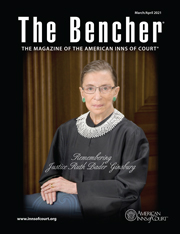Lessons from RBG on the Role of the Judiciary
The Bencher—March/April 2021
By Phil Weiser

Ruth Bader Ginsburg, associate justice of the Supreme Court of the United States, was both a student of and a practitioner of judicial review, the tradition of judges striking down popularly enacted laws as unconstitutional. This innovation, established in the United States and adopted across the world, is at the center of considerable legal scholarship, which evaluates whether and why judges should exercise this power. Ginsburg appreciated the important role of judicial review and warned us that it should be used carefully and appropriately, with an awareness of how constitutional judging interacts with the political process.
In her work as a scholar and judge, Ginsburg emphasized that judges must recognize that they operate in a social and political context. Indeed, it was her dissent in Shelby County v. Holder that earned her the “Notorious RBG” meme after she remarked that the majority’s decision to jettison popularly enacted voting rights protections was the equivalent “of throwing away your umbrella because you are not getting wet.”
Alexander Hamilton famously stated in Federalist 78 that the judiciary “has no influence over either sword or the purse.” It has, Hamilton explained, “neither force nor will, but merely judgment.” At its best, the judiciary earns the public confidence that its judgments are wise ones grounded in principle and deliberation, not political expediency. As Ginsburg put it in her Madison Lecture, judges should “speak in ‘a moderate and restrained’ voice, engaging in a dialogue with, not a diatribe against, co-equal departments of government, state authorities, and even her own colleagues.” A corollary of this call, as Ginsburg put it in an essay praising Byron White, associate justice for the Supreme Court of the United States, is for courts “to consider the consequences and common sense of the legal rules it announ[ces].”
How Supreme Court justices (and judges on other collegial courts) treat and engage with one another is part of how judges build or undermine confidence in the rule of law. As Ginsburg put it in her Madison Lecture, “rule of law virtues of consistency, predictability, clarity, and stability may be slighted when a court routinely fails to act as a collegial body.” To that end, Ginsburg valued the norm of listening and working to build shared understandings developed through respect and dialogue. It was that commitment to respectful relationships that explains how she and Associate Justice Antonin Scalia became friends, despite their disagreements, and learned from one another. As Ginsburg explained, their disagreements were instructive and helped her sharpen her thinking. And as Scalia explained, it would be impoverishing to only have friends who shared our views. He valued their friendship even when she adopted different positions.
Ginsburg was convinced that the exercise of judicial review should be, as she put it during her confirmation hearings, “rooted in the place of the judiciary—of judges—in our democratic society.” This means that the court should hesitate before it “steps boldly in front of the political process.” As she appreciated, judges can overreach when they move too quickly to upend an existing legal regime, take actions too far ahead of their headlights, or act without regard to the social context or consequences. In this sense, her vision of judicial review—and the role of the judiciary—recognizes that it is an important part of our Constitution’s strategy for self-governance and should operate in dialogue and partnership with the political branches. In that sense, as Princeton University President Christopher Eisgruber, Esquire, explained, “the case for or against judicial review must depend upon a more pragmatic assessment of how well courts, by comparison to other available institutions, can serve democratic goals.”
May Ginsburg’s memory be a blessing and inspiration for a model of constitutional self-government that works toward a more perfect union.
Phil Weiser is the attorney general of Colorado and served as a clerk for Associate Justice Ruth Bader Ginsburg during the 1995–1996 term.